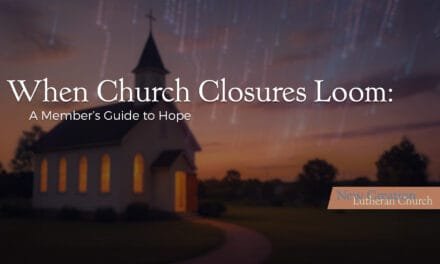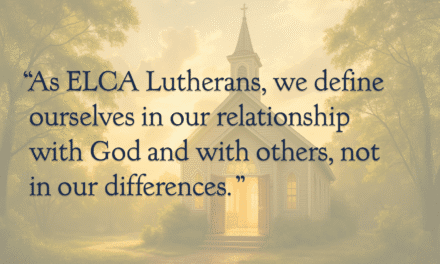Across the United States and the UK, something curious is happening in the world of faith communities. After years of decline in church attendance, new data points to signs of stabilization—and even pockets of unexpected growth. But this growth isn’t happening evenly, and for churches like ours, that opens both a challenge and a door.
At New Creation, we are a welcoming, affirming, and progressive Lutheran church. We have nearly 60 members—many longtime faithful—but only about 20 show up on an average Sunday. Roughly 75% of our attendees identifies as female. Our pastor is a strong, compassionate woman. We are LGBTQ-affirming, justice-oriented, and rooted in the Gospel.
So why aren’t we growing?
A Global Shift, a Local Opportunity
In the UK, church attendance among Gen Z has surprisingly increased—especially among young men. Recent studies show that monthly church attendance for 18–24-year-olds quadrupled from 4% to 16% in just six years, with men outpacing women 21% to 12%. This isn’t your parents’ youth group revival—it’s driven by a complex mix of cultural searching, resistance to secular burnout, and the desire for meaning, ritual, and identity.
Meanwhile, in the US, the long decline in Christian identity appears to be leveling off. Pew Research reports that about 62% of US adults still identify as Christian, and while traditional attendance remains lower than it once was, the floor seems to have been reached. Especially in conservative churches, where clearly defined beliefs and communities are drawing in both new converts and returning members.
But what about progressive churches like ours?
The Gender Gap No One Talks About
The difficult truth is that while men are increasingly showing up in churches overseas, US women—especially younger women—are stepping away. In many cases, that’s a direct response to what they experience as harmful or limiting theology, patriarchy in church leadership and culture, silence around reproductive rights, and marginalization of LGBTQ voices.
Our church isn’t like that. We proudly ordain women. We preach justice. We welcome LGBTQ+ people fully into the life, leadership, and love of our church. Yet we still see more empty pews than full ones.
So here’s the hard question: Are we just quietly affirming… or are we boldly inviting?
The Next Chapter Is Not Inevitable—It’s Intentional
To position ourselves for growth, we must speak not only to who we are, but to why that matters in the lives of people searching for a place to belong. And we must do so with the same clarity, energy, and intentionality that is fueling growth in more conservative spaces.
Here’s how we can begin:
1. Turn Our Values Into a Vision for Belonging
We already welcome people across gender identity, sexual orientation, race, and background. But what if we re-framed that welcome as an invitation to build something together?
- Don’t just say “All are welcome.” Say: “Come as you are and share your gifts. Help shape what church looks like for the next generation.”
- Use stories—on social media, in sermons, in conversations—to show how inclusive faith transforms lives.
2. Highlight Women’s Leadership—Boldly and Publicly
We are already led by a woman pastor. Women’s voices are present in the pulpit, in music, and in decision-making every week. That’s not just uncommon—it’s powerful.
- Let’s not keep that a quiet truth. Let’s name it and celebrate it in our outreach, our website, and our storytelling.
- Share stories of how men and women working side-by-side shape our faith community—not as a novelty, but as a norm that reflects the full image of God.
3. Create Purpose-Driven Community Spaces
Gen Z isn’t looking for pews—they’re looking for meaning, conversation, and community.
- Host regular discussion nights on spiritual, social justice, and mental health topics.
- Collaborate with other affirming churches to hold events specifically for young adults.
- Invite local artists, poets, musicians—especially LGBTQ creators—to use the sanctuary as a sacred space for storytelling.
4. Invest in Digital Evangelism
If Gen Z found church through TikTok, we should take note. A digital presence isn’t just marketing—it’s ministry.
- Post short sermon clips and music on Instagram and YouTube.
- Feature member testimonials about what drew them to New Creation.
- Consider launching a podcast or series on “Faith Without Patriarchy” or “The Gospel for Today.”
5. Name the Elephant: Patriarchy
Be clear that our church is different not by accident, but by design. That we believe dismantling harmful systems—including within the Church—is central to the Gospel.
- Talk openly about the harm patriarchy has done, especially to women and LGBTQ people in faith communities.
- Offer healing spaces and rituals for people recovering from church-based trauma.
- Keep affirming that leadership, wisdom, and spiritual power do not have a gender.
What’s Next?
We don’t need to mimic the conservative churches gaining young men. But we can learn from their clarity. Their urgency. Their belief that church can still matter.
At New Creation, we believe that too.
Let’s not wait for people to stumble in. Let’s invite them to a table already set with love, justice, and joy. Because the Church of the future isn’t somewhere else—it’s right here. It just needs our hands to build it.
But here’s the truth: the small team of volunteers who keep this church running can’t do it alone. If New Creation is going to grow—not just in numbers but in purpose and presence—it will take all of us.
So here’s the invitation: Find your passion.
Is it music? Organizing? Hospitality? Social justice? Tech? Art? Teaching? Prayer?
Whatever brings you joy—whatever stirs your spirit—we believe it has a place here. Let’s dream together. Let’s build something lasting. Let’s grow a church that reflects the radical, inclusive love of Christ.









 Our Latest Updates on
Our Latest Updates on
